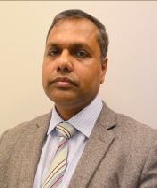
Conference information
Papers
Sponsored By



Biography:
Prof. Nemai Chandra Karmakar graduated with BSc (EEE) and MSc (EEE) from Bangladesh
University of Engineering and Technology in 1987 and 1989, respectively, MSc in EE
from the University of Saskatchewan, Canada in 1992, PhD in ITEE from the University
of Queensland in 1999, PGDipTHE from Nanyang Technological University in 2001 and
MHEd from Griffith University in 2007. He worked as a microwave design engineer at
Mitec Ltd., Brisbane from 1992-
Radio frequency (RF) and wireless sensor technologies have been impacting the new
millennium with the greatest force than ever before. The motto is to wirelessly
collect and process data at every point of transactions of our everyday life for
the betterment of national economy, health and wellbeing of mass population. Wi-

Dr. Nemai Chandra Karmakar
(Associate Professor)
Department of Electrical and Computer Systems Engineering
Monash University
The seminar will present the advancements of: (i) fully printable chipless RFID and RF sensors for low cost item level and ubiquitous tagging and sensing to fulfil the mottos of IoE, (ii) smart antennas for 5G communications, (iii) wireless energy harvesting, RF sensors and microwave biomedical devices for orthopedic needles for bone healing and growth, wireless sleep monitoring and healthcare of old edge people, (iv) robotics for RF industrial applications, (v) signal processing and detection, and finally, (vi) microwave power equipment diagnostics and sensing for smart grids and IIoT. For the last eleven years Monash Microwave, Antenna, RFID and Sensor Laboratory (MMARS) at Monash University, Melbourne, Australia, has been developing these technologies in collaborations with half a dozen Australian local and multinational industry partners. So far nine patent applications are lodged only in the field of chipless RFID and RF sensors for Australian polymer banknotes, library access cards and books, and pathology samples. Two industrial grade RF probes for automated power equipment health monitoring for smart grid have been delivered to Australian power industry and they are in the international market.
However, there are challenges in university and industry collaboration as the philosophies of university and industry are disjoint. While university focuses on pedagogy, gathering and sharing of new knowledge and recognition, industry focuses on return of investment. Innovations through collaborative industrial research projects can reduce the gap. The seminar will also present how the new RF and sensor technologies have promoted research collaborations to bring these two entities closer for the greater benefits of national economy.
Abstract:
Radio frequency (RF) and wireless sensor technologies have been impacting the new
millennium with the greatest force than ever before. The motto is to wirelessly
collect and process data at every point of transactions of our everyday life for
the betterment of national economy, health and wellbeing of mass population. Wi-
should be low cost and low power for mass deployment and long life. University research can affordably develop these technologies in collaboration with industry sectors.
| Prof. Yehia Antar |
| Prof. Atif Shamim |
| Prof. Nemai Chandra Karmakar |
| Prof. Mohammad S. Sharawi |
| Prof. Dr. Ezzeldin A. Soliman |
| Dr. Mohamad Essaaidi |
| Prof. Sedki M Riad |
| A. Prof. Dr.-Ing. Mohamed El-Hadidy |